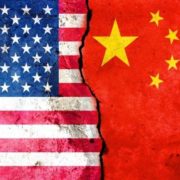We are at a turning point in the protests in Hong Kong, and the government is apparently gaining the upper hand, as it could be about to transform the movement into a huge publicity win for Beijing.
Protests over the weekend drew some 200,000 participants, a far cry from the 2 million of the early marches. Violence is growing. The police are taking the gloves off in handling demonstrators, allegations of torture are circulating, and protesters are radicalizing by attacking police and smashing public property.
This is apparently pushing more people away. Most Hong Kongers were firmly behind the movement at the beginning and even tolerated occasional violence, but now many are less enthusiastic, afraid of being caught between the violence of the police and that of the radicals.
The movement appears rudderless and not simply because there is no leadership. Even sympathizers and supporters are failing to provide a clear political message for the protests. Why are the protests continuing? What is the goal? How to achieve it concretely?
Protests started against a proposed extradition bill that would allow Beijing to arrest people in Hong Kong and bring them back to China. Beijing wanted the law to prevent the territory from turning into a potential springboard for revolution on the Mainland. The bill was first suspended and then yesterday struck down – so the movement won. The movement should have then stopped or at least paused for regrouping and rethinking. It doesn’t, and that is perhaps the problem.
It doesn’t stop perhaps simply because the genie of «Hong Kong’s anger at the Mainland and the way it has been running the territory for decades» was out of the bottle and very hard to put back in.
A genie of anger out of the bottle; the tycoons and democracy
This anger is also directed at the local tycoons who for decades have been in bed with Beijing’s public and private interests for their own private profit while remaining totally oblivious to the welfare of the city and its people. These are massive interest groups, intimately interconnected with Beijing’s open and hidden power structure. It is very difficult to reform them without also deeply altering China’s political and economic organization. And even if that does happen, the change would take objectively a lot of time, as the structure has been working with immense ramifications for some 40 years. These interests smother any social mobility for young people who remain at the lowest rung of the social ladder.
The other issue is democracy. Hong Kong is a free society but without democracy. This can work only if everything is basically fine, but when there are problems, if this freedom is not channeled into political outlets that can shape them in a constructive way, then all goes mad. It is a structural problem: either Hong Kong loses its freedom, and thus its status as an important stock exchange, where freedom is necessary to function, or it becomes reasonably democratic. China may not want to lose the Hong Kong Stock Exchange, an important safety valve between the closed Chinese economy and the open global economy. Protesters should therefore negotiate for a democratic structure in Hong Kong that is acceptable to both Beijing and the external world – otherwise, the territory would lose its status.
The leaders of the protests apparently are not talking about this, but are more concentrated on accusations and counteraccusations of violence between police and protesters. But perhaps these are just details.
Without a broad political analysis from the protesters, Beijing is gaining the political upper hand. Ongoing demonstrations and relatively restrained use of force by the police is proving a few points to the domestic Chinese audience and to many Asian onlookers, traditionally not great fans of “Western democracy”. Beijing can argue that these protests are going nowhere, and they create havoc and destruction of wealth in return for pipedreams.
This line of argument, which may not find a lot of traction in the West, can build growing support in Hong Kong, China, and Asia for Beijing’s handling of the crisis, and it also delegitimizes the protests. Then Xi Jinping, who found a way to tackle the issue, may have already struck a huge victory.
This doesn’t rule out things taking a different turn in the future. The movement could turn completely violent, and Beijing could crack down with more force, leaving Hong Kong smoldering. But at the moment, this is not happening and arguably it would be in nobody’s interest, at least in the next few weeks and months.
Hong Kong’s medium-term issues
This still leaves to Beijing the issue of tackling the complicated interest groups in Hong Kong and channeling the local freedom into a viable political democracy, which can be only Western, as the economic system of the rest of the globe. After the Tiananmen crackdown in 1989, Beijing offered a long-term political solution to their concerns. The youngsters who had nothing and wanted political participation were given the chance to make money by any means, and to have social and sexual freedom in exchange for keeping away from politics. It was a new social pact, and it worked – those revolutionary energies fueled growth in China for three decades. The Tiananmen pact has been broken with the anti-corruption campaign which stipulated that “becoming rich by any means” is no longer tenable. Beijing should offer then also a new political pact to the growing middle class who feels uneasy with the old way of doing business gone and the new one yet to be brought into shape. But China is a very big mammal, it can wait a few years. Hong Kong is much smaller, the situation is more explosive and something must be done sooner.
What is the new social pact for Hong Kong that Beijing is going to offer? As Hong Kong is a bridge between China and the global economy, the pact should be a new political pact, satisfying the new world situation (where the U.S. trade war is only the tip of the iceberg of growing discontent) and China’s new situation (where the post-Tiananmen pact broke down).
These still are issues for the next few months.
In the very short term, Xi’s victory opens a massive political opportunity for him. It proves the feasibility of the “Qiao Shi’s solution” proposed for the Tiananmen movement in 1989. Xi’s father, Xi Zhongxun, was allegedly on Qiao’s side. If that solution had been followed, the history of the past 30 years could have taken a different route. This may have massive repercussions today.
This is the context that the Hong Kong movement perhaps should not ignore and it should be able to contribute at this level. At stake is not only Hong Kong, but the fate of China and of the world.





